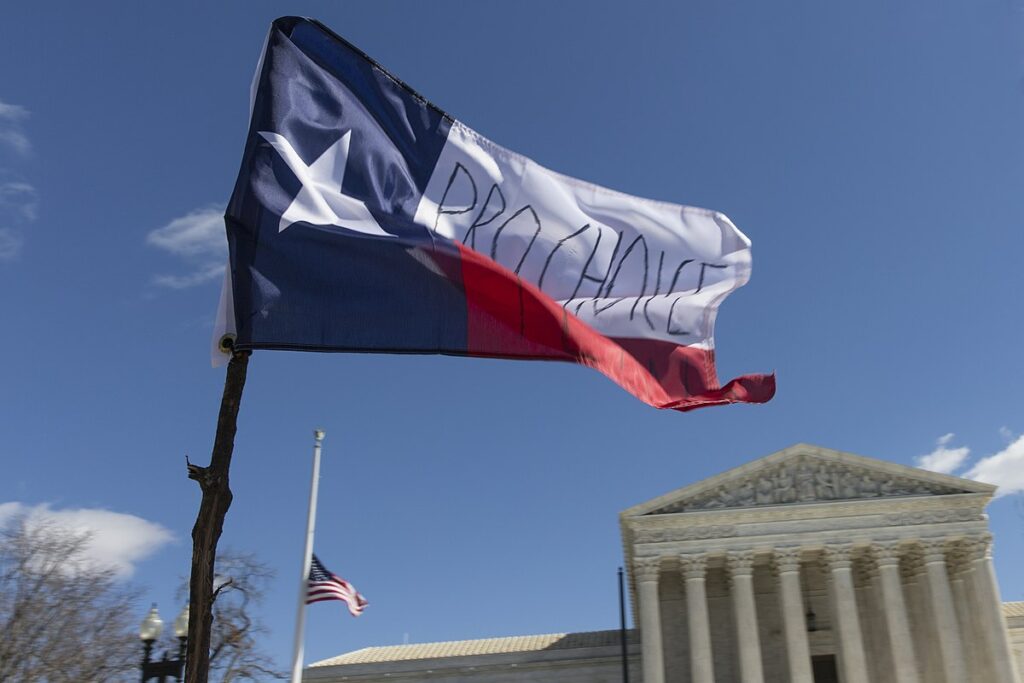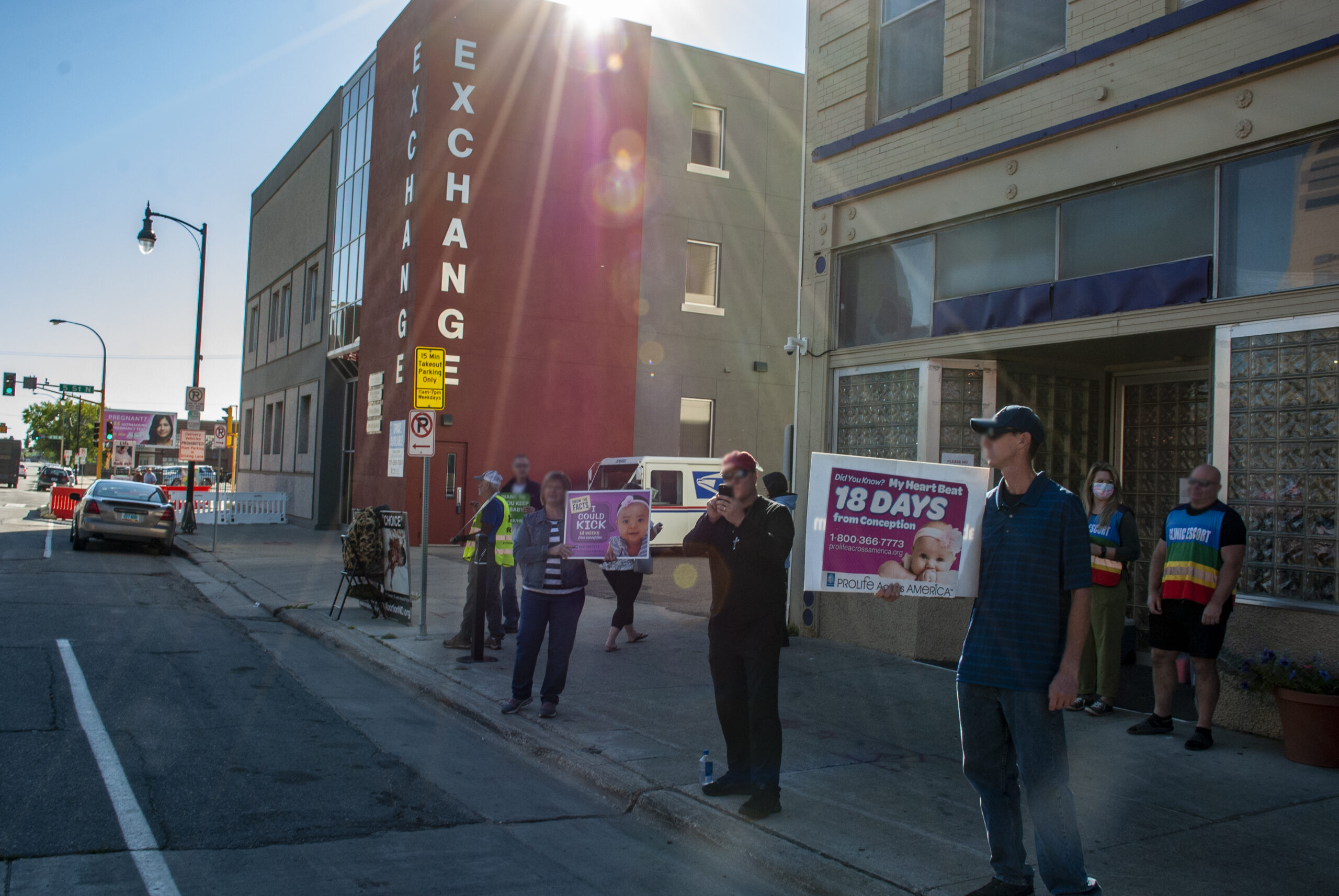The right to bodily autonomy is on the line

As of Wednesday, Sept. 1, Senate Bill 8 has gone into effect in Texas. The bill, a total ban on abortions after six weeks of pregnancy, even in cases of rape and incest. This bill is a startling development for all individuals born with female sex organs, not just those living in Texas.
At six weeks, most people aren’t even aware they are pregnant. Bills like these not only ban abortion, but take away the right afforded by Roe v. Wade for women to choose to have an abortion without excessive government restriction.
The precedent this sets for similar bills presented in other states and the purposeful refusal of the Supreme Court to take action do not bode well for the state of reproductive rights in North Dakota.
Not less abortions, just less safe abortions
Abortion bills like the one in Texas do little to stop abortions from taking place. In a 2017 study from the Guttmacher Institute, researchers found that abortions occur just as frequently in the countries with the most restrictive abortion laws — banning it outright — as those countries where there were the least restrictions — where it’s allowed without reasoning or restriction.
What this means is that abortions will still be happening, but instead of access to safe, affordable healthcare, pregnant patients will be forced to take other, often extreme, measures in order to get an abortion. At the same time individuals with wealth and access will still be able to get abortions out of state or in secure facilities.
Disproportionate Consequences
This leads into the idea that certain groups will have unequal access and will suffer from this inequality accordingly.
Black, Latinx and individuals with limited access to transportation and finances will be most affected by this new bill.
The American Civil Liberties Union reports that Texas has an incredibly high maternal mortality rate. Forcing individuals to carry a pregnancy against their will can be life-threatening and terrifying.
Not to mention that as it stands, the average Texan citizen will have to drive 248 miles to get an abortion out of state; a task that requires time Texans no longer have, funds that aren’t always available and transportation many don’t have access to.
Where this Leaves Pregnant Individuals
The U.S. National Library of Medicine states that most women only realize they’re pregnant at the five or six week mark. This means people in Texas will either have a very limited amount of time to consider an abortion or have no time at all.
More than this, because the bill makes absolutely no exceptions, individuals — including minors — will not be allowed to abort even in cases of rape or incest. The NLM estimates that roughly 22,500 American women get abortions each year due to rape or incest. That’s 22,500 women who, without access, would have to carry a reminder of their assault or violation constantly.
“The pro-life, pro-choice argument will never be resolved because it rests on the question of when a life begins and nobody will ever agree on the rhetoric or meaning of life” – Amanda Unger
Positions of Medical Professionals and Americans
A huge problem with bills like these is that they are often ideologically and morally rooted in religion: a religion that only a portion of Americans share.
A 2020 Gallup poll reported that despite a fluctuating split of nearly equal percentages of pro-choice and anti-choice Americans (at 49 and 47% respectively), 77% still said they believed Roe v. Wade should remain legal.
More than this, a different NLM study found that 78% of physicians believe abortion should be legal, even if only 56% identify as anti-choice. This is important because it shows that qualified individuals, even the ones with ideologically opposing views, recognize that abortion should still be accessible in spite of their own personal beliefs.
The Politicization of Rape in America
To better understand why so many are so frustrated with this bill — besides just plainly being outraged over the removal of bodily autonomous rights — it’s important to understand the history and the way the topics of abortion and reproductive rights in general have been used as a political tool to polarize individuals on both sides of the political aisle.
According to Vox, it wasn’t until the 1970s during Richard Nixon’s presidential campaign that the Republican Party became anti-choice when he used anti-abortion rhetoric to appeal to Catholic voters. The move towards anti-choice policy was part of the party’s effort to look pro-family and gain new conservative voters.
Before 1976, the majority of Republican voters were pro-choice and a Gallup poll from 1988 shows that it was only then that Republicans began to oppose abortion more than Democrats.
These anti-choice discourses have their roots in Catholicism but it’s important to note that less than 22% of Americans are Catholic. So why is a minority group making decisions for everyone based on religious ideals the majority does not share?
Junior Political Science major, Amanda Unger, said it beautifully: “The pro-life, pro-choice argument will never be resolved because it rests on the question of when a life begins and nobody will ever agree on the rhetoric or meaning of life.”
Neither pro- or anti-choice individuals seem capable, or quite honestly willing, to change their view on when life begins. With this being said, it shouldn’t be acceptable to force someone who fundamentally disagrees with the assertion that life begins at conception to bend to the will of those who do.
More than this, individuals who get abortions often are those same individuals pushing anti-choice rhetoric. The Guttmacher Institute found that the most common religious affiliation for individuals getting abortions, if they had one at all, was Catholics at 24% of all patients.
Preaching and practice are different, as anti-choice individuals getting abortions clearly illustrates. The frustration of many pro-choice individuals stems from being told what to do with their bodies by a group that was once politically pro-choice, is religiously disconnected to them and often enjoy the rights they try to strip from others.
Incentivization of citizens through lawsuits
Senate Bill 8 incentivizes everyday citizens to essentially tell on individuals giving assistance in obtaining an abortion after the six-week mark. Any private individual, both in and outside of Texas, can sue anyone trying to help someone get an abortion.
In court, they could collect $10,000 for each abortion they report. This money will come directly from whomever tried to assist someone in gaining access to medical care or guidance. Citizens will be deputized to report medical professionals attempting to do their jobs.
What this means for North Dakota
The North Dakota Senate is overwhelmingly Republican. As of Jan. 1, 2021, abortion in the state will be banned if Roe v. Wade is overturned. The Supreme Court’s refusal to step up in Texas is a scary message to women about what the court would rule should Roe v. Wade be presented once again.
This decision was made possible in Texas, and could be made possible in North Dakota by the same people using the “My body, my choice” slogan as a way of poking fun at the pro-choice argument while arguing against masks and vaccines.
“Preaching and practice are different, as anti-choice individuals getting abortions clearly illustrates. The frustration of many pro-choice individuals stems ohhh from being told what to do with their bodies’ by a group that was once politically pro-choice, is religiously disconnected to them and often enjoy the rights they try to strip from others.”
Of course, this line of reasoning misunderstands how masks are worn to protect others and vaccines help control the spread to at-risk individuals, while the choice over having to carry a pregnancy to term — in this case, a pregnancy that could have result from rape or incest — is and should remain a personal choice.
The point is, if anti-choice supporters can connect the dots about how horrific it is to enforce decisions about someone else’s body — even in a way that contorts how the science of a mask works and equates donning a piece of cloth to the medical, financial and emotional commitment of carrying a baby — then they understand that denying choice is wrong.
Why should an individual’s personal, and often religious, beliefs infringe on the rights of others when that choice doesn’t affect them? Or, as is the belief of the majority of Americans and most medical professionals, when the decision truly doesn’t affect anyone outside of the individual making the choice to get an abortion at all?
If you think an embryo that is a cluster of cells, is a baby with a heartbeat — ignoring that embryos don’t have hearts — then there is little I could say to convince you otherwise. The fact that medical professionals, the majority of Americans and most religious and political organizations up until the 1970s disagree with you hasn’t changed your mind, how could I?
Still, please be cognizant that your personal and religious beliefs should not dictate the lives of individuals who choose to trust science and their own bodies over your opinions. To force others to make the same decisions you would or wouldn’t make in the same situation, shouldn’t be tolerated.
Right now is a time to be there for your mothers, sisters, friends and all those assigned female at birth. Their rights are at risk and this is an upsetting time.
Personally, I’m angry and upset that religious ideas I don’t share and beliefs that contradict the knowledge I have of my own body could be used to tell me what to do with it.
As someone who has experienced rape, I’m angry that individuals who have suffered through similar experiences could be forced to carry a reminder of their assault every day without choice.
I’m angry, but mostly scared for the future and how what has happened in Texas could set a precedent in other states, including North Dakota. Abortions could be almost completely illegalized and health professionals and friends could be used to punish individuals attempting to make the best decision for their lives.
If you’re anti-choice, honestly, I don’t really care. Keep your thoughts, religion and policies to yourself. I’m happy to let you have them so long as you allow others to have the same freedom of choice over their lives and allow them to do so in a way that is safe.
If, but more likely when, new laws are proposed on abortion in North Dakota, I know I won’t be alone in trying to fight these new policies. But I ask those who remain neutral, or even those who disagree with me: Either help me protect all those at risk of losing their reproductive rights — people who currently have lives, hopes and dreams — or please and kindly, back the f**k off.
